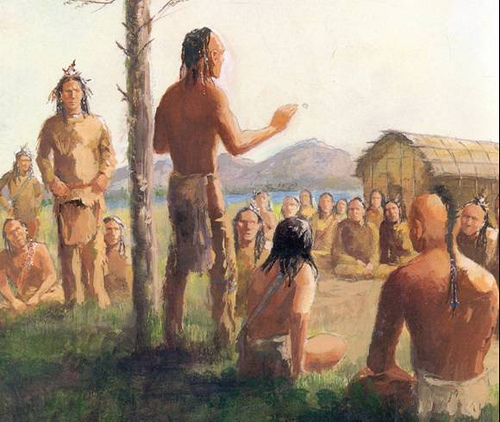The views expressed in our content reflect individual perspectives and do not represent the authoritative views of the Baha'i Faith.
He is God, the Creator, the Maker, the Shaper. To Him belong the Names Most Beautiful. All that is in the heavens and the earth magnifies Him; He is the All-mighty, the All-wise. – Qur’an 59:24.
The Baha’i Faith has a background in Islam, just as Christianity historically emerged in a predominantly Jewish environment. In Islam God is revered by different titles. These are described as the “Beautiful Names of God” (asmāʾ Allāh al-ḥusnā). Traditionally, these “Beautiful Names of God” are reckoned to be 99 in number. Presumably God has an infinite array of “Names” or attributes, but 99 is a good number for devotional purposes.
The “Names” of God are not simply names or labels—they are metaphors. In Islamic philosophy, a “name” is a designation that can be described by a quality, or attribute. So these “Names” of God represent dynamic powers that operate in the universe, in ways that we can only begin to apprehend. Being mindful of the “Names of God” is a form of meditation or mysticism. The process of meditating on God is customarily referred to simply as “remembrance” (dhikr).
The Baha’i writings often refer to God as the “Unknowable Essence.” If God is unknowable, then how can we know anything about God? How can we know God’s names? What is the solution to this dilemma?
Just to complicate the problem even more, how do we know anything about anything? The problem arises because we simply cannot know things in their “essence.” We can only know about things by virtue of their empirical characteristics, documented behaviors, verifiable qualities, observable manifestations, traceable movements, etc. Think of these various phenomena as “attributes,” as Abdu’l-Baha explains:
Know that there are two kinds of knowledge: the knowledge of the essence of a thing and the knowledge of its attributes. … For the inner essence of a thing can never be known, only its attributes. … How then can the ancient and everlasting Lord, Who is sanctified above all comprehension and imagining, be known in His Essence? That is, as created things can only be known through their attributes and not in their essence, the reality of the Divinity, too, must be unknown with regard to its essence and known only with respect to its attributes. – Abdu’l-Baha, Some Answered Questions, newly revised edition, pp. 253-254.
If we can know things only by their extrinsic attributes, not by their intrinsic essences, how much more true when it comes to our knowledge of God?

Deganawida The Great Peacemaker
Although God is unknowable, we “know” God through His attributes. While it’s possible to infer the existence of a supremely intelligent Creator from the intelligent design of the universe itself, the most direct way of knowing about God is through the great spiritual teachers—such as Abraham, Moses, Zoroaster, Jesus, Muhammad, the Peacemaker (Deganawida), the Bab and Baha’u’llah—who revealed enlightened teachings about “the Great Spirit” who sent these teachers, and who prescribed remedies for the social ills of their day and age by way of renewed ethics and updated social laws.
Now let’s take a look at another “Name of God.” The Baha’i month of “Glory” (jalāl) lasts nineteen days in April. What does “Glory” signify in relation to God? How does the attribute of “glory” pertain to humanity? In relation to God, “Glory” signifies God’s majesty and grandeur—and much more besides. But how does “glory” relate to human beings? How can you and I manifest the spiritual attribute of “glory”?
To answer that question, let’s start from this premise: The attributes of God are meant to be reflected in each of us. They are already within. They are simply waiting to be potentialized, so that the latent becomes patent, as Abdu’l-Baha explains:
Now, the world of existence, indeed every created thing, proclaims but one of the names of God, but the reality of man is an all-encompassing and universal reality which is the seat of the revelation of all the divine perfections. That is, a sign of each one of the names, attributes, and perfections that we ascribe to God exists in man. If such were not the case, he would be unable to imagine and comprehend these perfections…
Thus, the divinity of God, which is the totality of all perfections, reveals itself in the reality of man—that is, the divine Essence is the sum total of all perfections, and from this station it casts a ray of its splendour upon the human reality. In other words, the Sun of Truth is reflected in this mirror. Thus man is a perfect mirror facing the Sun of Truth and is the seat of its reflection. The splendour of all the divine perfections is manifest in the reality of man, and it is for this reason that he is the vicegerent and apostle of God. If man did not exist, the universe would be without result, for the purpose of existence is the revelation of the divine perfections. – Ibid., pp. 226-227.
First, let’s differentiate “glory” from “vainglory.” “Vainglory” is self-aggrandizement, pride, narcissism, undeserved honor and unearned distinction. Even worse, self-glory inherently entails the idea that one is superior to others. This pride leads to downfall. This subjective sense of “glory” is the opposite of the objective meaning of “glory.” In the objective sense “glory” is defined by the Oxford English Dictionary as follows:
2. objectively.
a. Exalted (and, in mod. use, merited) praise, honour, or admiration accorded by common consent to a person or thing; honourable fame, renown.
b. the glory of God: the honour of God, considered as the final cause of creation, and as the highest moral aim of intelligent creatures.
3. Something that brings honour and renown.
Now consider the following passage from the Baha’i writings:
O Son of Man! Thou art My dominion and My dominion perisheth not; wherefore fearest thou thy perishing? Thou art My light and My light shall never be extinguished; why dost thou dread extinction? Thou art My glory and My glory fadeth not; thou art My robe and My robe shall never be outworn. Abide then in thy love for Me, that thou mayest find Me in the realm of glory. – Baha’u’llah, The Hidden Words, p. 7.
Think of “glory” not as an action in itself, but as the consequence of an action. In other words, simply ask yourself this question regarding any action that you may contemplate: “Will this action redound to the glory of God, to the benefit of others, and to my own dignity, integrity and respect?”
Self-respect is a greater glory than any fame or renown.
You May Also Like
Comments

















Baha’is would be quite surprised to hear this! Have you had any close contact with Baha’is personally? If so, you would know that Baha’is do not self-identify as Muslims, nor as Shia Muslims. Simple as that!
As for quoting scriptures “out of context,” that would be totally against my academic training, both as a PhD in the academic study of religion (University of Toronto, 1996) and as a practicing attorney (JD 2006).
You may have misconstrued the epigraph (opening quote) at the beginning of the article, which was a verse from the Quran. I simply wanted to ...demonstrate the origin of the concept of the “Names of God.” Yes, the Baha’i Faith has its origins in Islam. But the Babi movement, which preceded the Baha’i Faith, clearly and decisively broke away from Islam. Again, Baha’is are not Muslims. While Baha’is respect the Qur’an, it is not a Baha’i scripture.
As for religious violence, did you know that, on April 22, 1863 in Baghdad, Baha’u’llah abolished holy war (jihad)? So the website that you posted, which is a collection of Islamic texts on holy war, simply do not apply to the Baha’i context, since holy war is categorically and absolutely forbidden for all Baha’is, anywhere and everywhere.
I don’t know where you get the idea that the Aqdas (the Baha’i book of laws, known as the “The Most Holy Book”) promotes “misogyny and discrimination.” Respectfully, it appears to me that you have little or no firsthand knowledge of Baha’is personally or of Baha’i scriptures.
The overarching purpose of the Baha’i Faith, after all is to promote unity.
You also say that Baha’i beliefs “are not based on reason and evidence.” Did you know that one of the basic Baha’i principles is that science and religion should agree? And that reason and faith should find common ground?
I could turn your argument on its head by pointing out that you have not cited even one example of what you are alleging. What “reason and evidence” can you summon or marshal as proof in support of your assertions? Without offering your own evidence and reason, your critiques are simply unwarranted.
So, that said, I invite you to actually investigate the truth-claims of the Baha’i Faith, and to read the Baha’i scriptures. If you had you done so previously, I’m sure you would not have posted the comment that you did.
Christopher Buck PhD JD
cherry picking religious quotes, and dismissing the unjust and discriminatory pages of Abrahamic scriptures as "out of context", is a systematic way to promote inherited beliefs. Such beliefs are not based on reason and evidence, but based on indoctrination for more than 90% of the world's faithful.
http://www.thereligionofpeace.com/pages/quran/violence.aspx
If you look back to the 1950s what world wide effort has anything to compare with a third female representation on national levels of governance? Is there any effort that is even half that? But even 60 years later the most common situation in the countries in the world is 10% female representation in government in most of the world. And the best of the best of the countries - literally the top 10 - only compare with ...Bahá’í rates of service of women because they use quotas. But Bahá’ís have a governance model that doesn’t need quotas - we just have no one running for office, everyone eligible to be voted for, secret ballots, and a call to vote for people one privately admires in realms of character, skills and knowledge - and a teaching of our religion that God has always seen men and women as equal. I don't see a misogyny result from our implementation of our teachings.